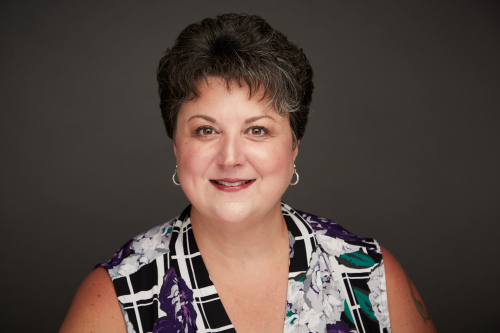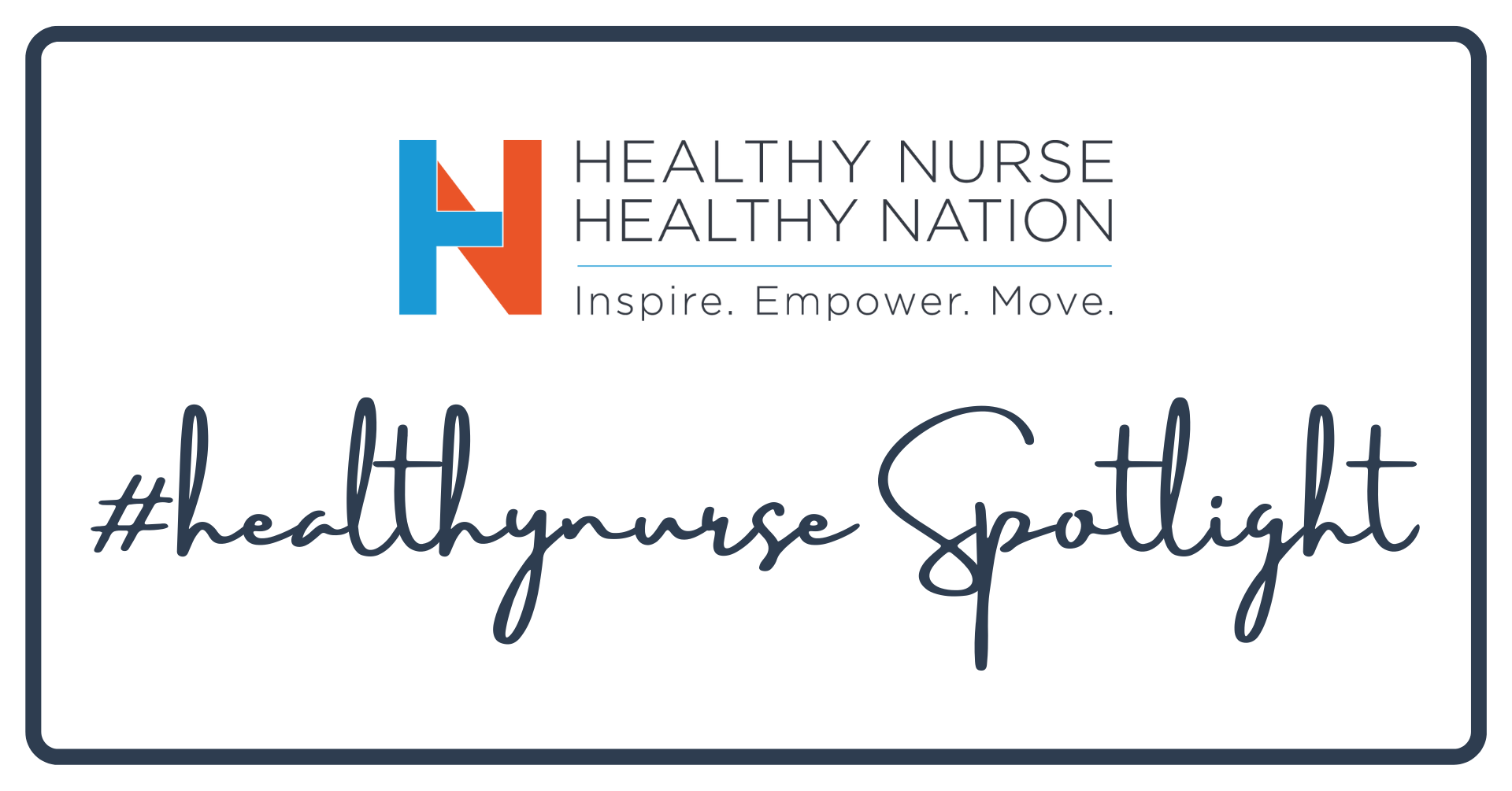Healthy Nurse, Healthy Nation™ - #healthynurse Spotlight Series - Jen Pettis, MS, RN, CNE
Published
Nurse Shines a Spotlight on Aging and Obesity
 Anyone working in health care knows that every person is an individual with individual needs. But all people have one thing in common. We are all aging, and it’s not an uncertain thing.
Anyone working in health care knows that every person is an individual with individual needs. But all people have one thing in common. We are all aging, and it’s not an uncertain thing.But no one needs to tell #healthynurse Jen Pettis, MS, RN, CNE, about the benefits of aging. Jen fell in love with gerontology (the study of aging) in high school when she worked as a nursing assistant in a nursing home. She learned early on how to care for older adults and treat them like she would treat her grandparents. Those lessons and her commitment to providing high-quality care to older adults have guided her ever since.
“I’ve realized how important it is to constantly elevate the message that older adults have tremendous meaning in their lives and contribute greatly to the lives of the younger people around them,” Jen says. “It’s an omnipresent thought in my head and permeates everything I do.”
Promoting a Healthy Attitude About Aging
Most people don’t realize how your view of aging affects your health. Research shows that people who view their aging positively live longer, have better cognitive functioning, sleep better, and are at lower risk for conditions including:
- Cancer
- Depression
- Diabetes
- Heart attack
- Stroke
People often think about aging as a decline, and that's not necessarily the case, Jen says. “There may be some declines in health,” she admits. “But there are also things that improve with age. Retired people may have more resources. They have more time to give back to their community or socialize. Getting older isn't bad. It's an amazing time in life.”
The challenge is changing people’s perception of aging. Jen spends her time helping people reframe aging (how we view and talk about it) both as part of her work and during her spare time. She volunteers with AARP as a lead trainer in their Disrupt Aging Classroom program. Jen also serves on the board of directors for the Alzheimer’s Association of Northeastern New York and is one of their community educators.
Meeting the Challenges of Aging and Obesity
Jen’s focus sharpened when she began working with The Gerontological Society of America (GSA), the organization that leads the National Center to Reframe Aging. Their focus on obesity and aging highlighted the need for social transformation and struck a chord in Jen.
“Aging and obesity have much in common in that nobody wants to discuss it,” Jen says. “It's not sexy to age in our country. I often say that ageism and sizeism are the last two acceptable ‘isms.’”
Jen’s passion comes through in her work with GSA’s KAER (pronounced "care") Toolkit for the Management of Obesity in Older Adults, which provides tools and resources to support evidence-based care for older adults living with obesity. The resources can help nurses and other health care professionals:
- Kickstart a discussion about body size with patients and their caregivers
- Assess for overweight/obesity
- Evaluate treatment options
- Refer for community resources
But Jen believes there are some simple steps all nurses can implement to improve their care of older adults who live with obesity:
- Recognize and treat obesity as a chronic disease
“You need to understand this complex disease of obesity,” Jen says. “It requires a lifetime of care, like high blood pressure, heart disease, or diabetes. It’s a multifactorial, chronic disease often based on a lifetime of improper or inadequate care.”
- Use respectful and appropriate language
older who has perhaps lived with a life of stigma, Jen says. Many people with obesity have likely felt like their weight is their fault and something that should be completely within their control.
“This isn’t an obese person or a fat person. It’s a person living with obesity,” she adds. “We need to make sure our communication is appropriate, avoids ageist and sizeist assumptions, and respects the person’s autonomy without being patronizing.”
When approaching the topic of weight, the focus should be overall wellness. Counseling someone about a healthy diet should be part of a larger discussion about things that are good for the heart and the head – or brain health, as Jen describes it. In addition to focusing on improving obesity care, Jen focuses a great deal of her work on brain health. In fact, the KAER Framework was first developed by a GSA workgroup seeking to enhance early detection of dementia and promote brain health. Jen is honored to also lead GSA’s work with The GSA KAER Toolkit for Primary Care Teams – a toolkit focused on supporting providers to implement a comprehensive approach to initiating conversations about brain health, detecting and diagnosing dementia, and providing individuals with community-based supports.
- Empower older patients
“When I taught people in nursing homes about care planning, I would ask them, ‘Do you know what makes life worth living for them?’ That's what that plan of care should be about,” Jen says. “It doesn’t matter whether we're talking about weight loss, brain health, or overall goals of care in general. It needs to come back to what's important to that individual.”
- Meet patients where they are
- Age
- Culture
- Health
- Socioeconomic challenges
“We need to recognize that some people aren’t eating healthy because they can’t afford it. Unfortunately, buying white bread and peanut butter is cheaper than turkey and whole wheat bread,” Jen says. “Someone of Hispanic descent may view rice and beans as an important staple in their diet. You can’t tell me not to make lasagna on Christmas Eve because it’s a family tradition. Those kinds of restrictions can be dealbreakers. But we can guide people to healthier eating options that fit their lifestyle and means.”
- Provide tools and treatment options
“We shouldn't make a judgment that someone isn’t appropriate for bariatric surgery or pharmacologic therapy because of their age,” Jen says. “Each person we treat needs to be educated and provided with options of care.” Jen argues that, regardless of age, each individual should have access to the full continuum of obesity care options.
Growing in Advocacy
Jen says her work at GSA has opened her eyes to the complexity of obesity and her own life.
“I reflect on my own life and think about my experiences and how those have shaped my life as someone who has struggled with body size,” she says. “It’s allowed me to better advocate for others and myself.”
She’s learned not to settle for health care that isn’t meeting her physical or emotional needs. She’s also learned to focus on what gives her joy, like helping people age gracefully and in good health.
“If something doesn’t give you joy, and you have the option of saying no, then say no,” Jen says. “As nurses, we have incredible patient advocacy skills. But we need to apply them to our own lives.”
Jen Pettis, MS, RN, CNE, is the Director of Strategic Alliances at The Gerontological Society of America. She was recognized in 2020 as a distinguished educator in gerontological nursing by the National Hartford Center of Gerontological Nursing Excellence. In 2021, she received Sigma’s Amy J. Berman Geriatric Nursing Leadership Award.
Are you a #healthynurse? Share your stories with us in our discussion.
Not a member of Healthy Nurse, Healthy Nation (HNHN) yet? Join today!
Sign up for our monthly challenges!

Blog #healthynurse Spotlight
07/05/2023 2:55pm CDT
The #healthynurse Spotlight is a shout out to nurses who are making changes in their lives to improve their health and wellness. You can too! Read their stories for inspiration here.




Post a Comment or Question